Expat women help empower local communities
Writer: Lin Songtao, Lin Jianping | Editor: Zhang Chanwen | From: Shenzhen Daily | Updated: 2022-10-31
A+ A- Print
Editor’s Note
编者按
Shenzhen Daily has joined hands with the Information Office of Shenzhen Municipal People's Government to launch a series of reports titled “Decade of Transformation,” to tell the story of Shenzhen in the eyes of expats. Rafael Saavedra, a popular YouTuber who has been living and working in China for seven years, will host the series, showing you Shenzhen, a dynamic and energetic city from the perspective of 60 expats. This is the second story of the series.
由深圳市人民政府新闻办公室与英文《深圳日报》(Shenzhen Daily)共同策划推出的系列全媒体国际传播作品《我们这10年:湾区老外说变化(Decade of Transformation)》已在各大主流媒体和互联网平台正式上线,该系列将集中展示过去十年以来深圳在各个领域所取得的伟大成就。此次系列作品中,在中国工作和生活了七年的知名网络博主Rafael Saavedra将向大家介绍60位外籍人士,通过他们的脚步和镜头记录和观察一座行进中的中国年轻都市。敬请垂注!
Profile
人物简介
Sava Tomoiaga from Romania has been living in Shenzhen since 1998. She is active in social activities and serves as the current president of Shenzhen Women’s International Club (SWIC). The 36-year-old social club is one big family for the members and has been helping expats assimilate and contribute to their local communities in Shenzhen.
来自罗马尼亚的Sava Tomoiaga自1998年以来就定居在深圳。她积极参与社会活动,是深圳国际妇女汇(SWIC)的现任会长。这个成立于36年前的社交组织对成员们来说是一个大家庭,并帮助许多外籍人士融入当地生活。
暖心“她力量”融入“鹏友圈”
Expat women help empower local communities
Sava Tomoiaga, who hails from Romania, was invited by the city’s foreign affairs office to witness the ceremony to launch Shenzhen’s evaluation guideline for the development of international blocks at a conference in Qianhai Kerry Center in September.
今年九月,来自罗马尼亚的Sava Tomoiaga接受深圳市委外办的邀请,与中外居民一道在前海嘉里中心参加《深圳市国际化街区建设评价指南》发布会。
Among a wide range of evaluation indicators that were released in the guideline, a specific one — Chinese and foreign cultural exchanges — was going into Tomoiaga’s considerations because she currently serves as the president of Shenzhen Women’s International Club (SWIC), an expat women’s social club.
作为外籍女性组织深圳国际妇女汇(SWIC)的会长,Tomoiaga在评价指南的各项评价指标中,首先关注到中外文化交流这一项。
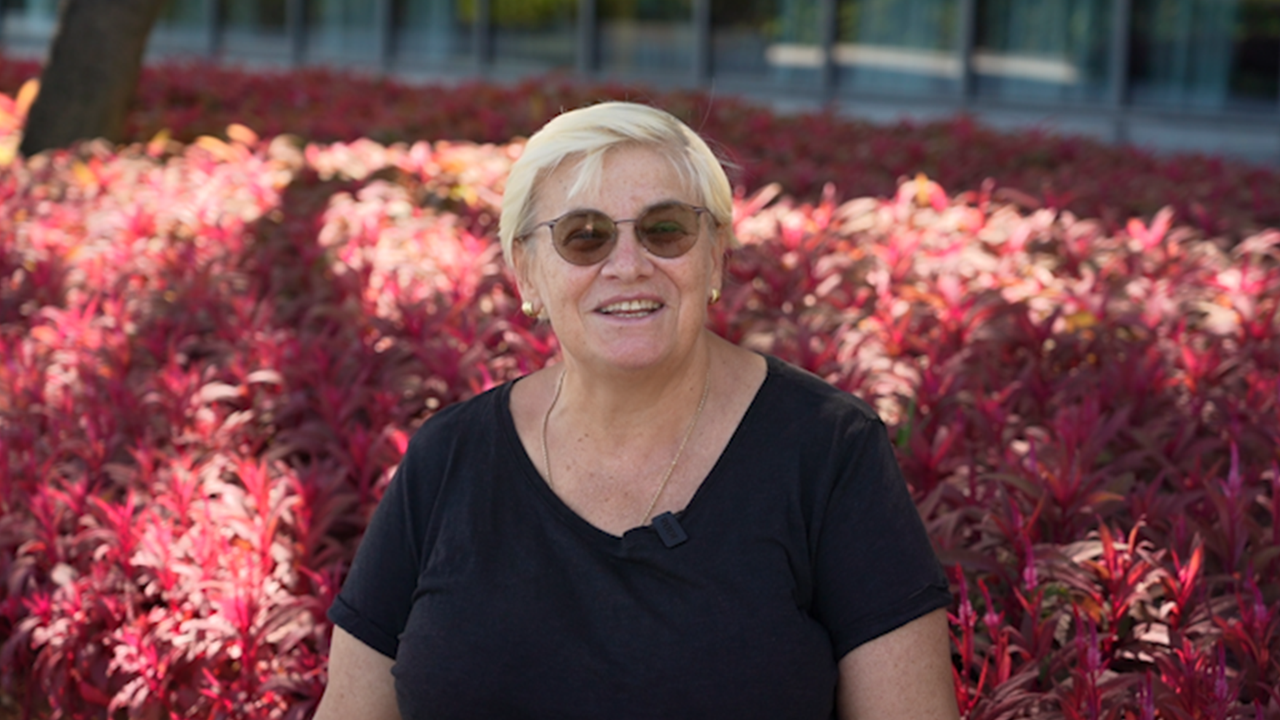
Sava Tomoiaga, president of Shenzhen Women’s International Club (SWIC), at an interview with Shenzhen Daily on Oct. 12. Lin Songtao 深圳国际妇女汇会长Sava Tomoiaga接受英文《深圳日报》采访。林松涛摄
“They [local community centers] invited many foreigners to learn about Chinese culture. We learned a lot. Our suggestion for the centers is also to invite some Chinese to learn about our cultures because every foreigner has their own heritage and brings in something new,” Tomoiaga told Shenzhen Daily, adding that the mutual understanding will help build stronger relationships between locals and foreigners.
“社区服务中心组织了精彩的活动邀请外籍人士参加,通过这些活动我们学习到了许多中国文化。我们希望他们也能组织一些活动来邀请中国人了解我们的文化,因为每位外国人都能给大家带来新知识,每个人的国家都有不同的文化传统。”Tomoiaga接受英文《深圳日报》的采访时说道。在她看来,相互理解有助于中外居民建立更紧密的关系。
The Romanian has been living in Shenzhen for 24 years, and she is passionate about exploring new things and active in social activities, especially volunteer work.
这位来自罗马尼亚的女士已经在深圳生活了24年。她喜欢探索新鲜事物,经常参加各项社会活动,尤其是参与志愿服务。
One big family away from home
他乡大家庭
“For many foreigners, who come here and cannot communicate in Chinese, to meet some foreign communities is one of the most important things to find out information,” the SWIC president said, “Members can collect the answers about where to find resources in the city from SWIC.”
“很多来到中国的外国人是不会说中文的。对他们来说,外国人社群是最重要的信息获取渠道之一。我们的成员就可以从SWIC找到如何在深圳寻找资源的答案。”这位会长说。
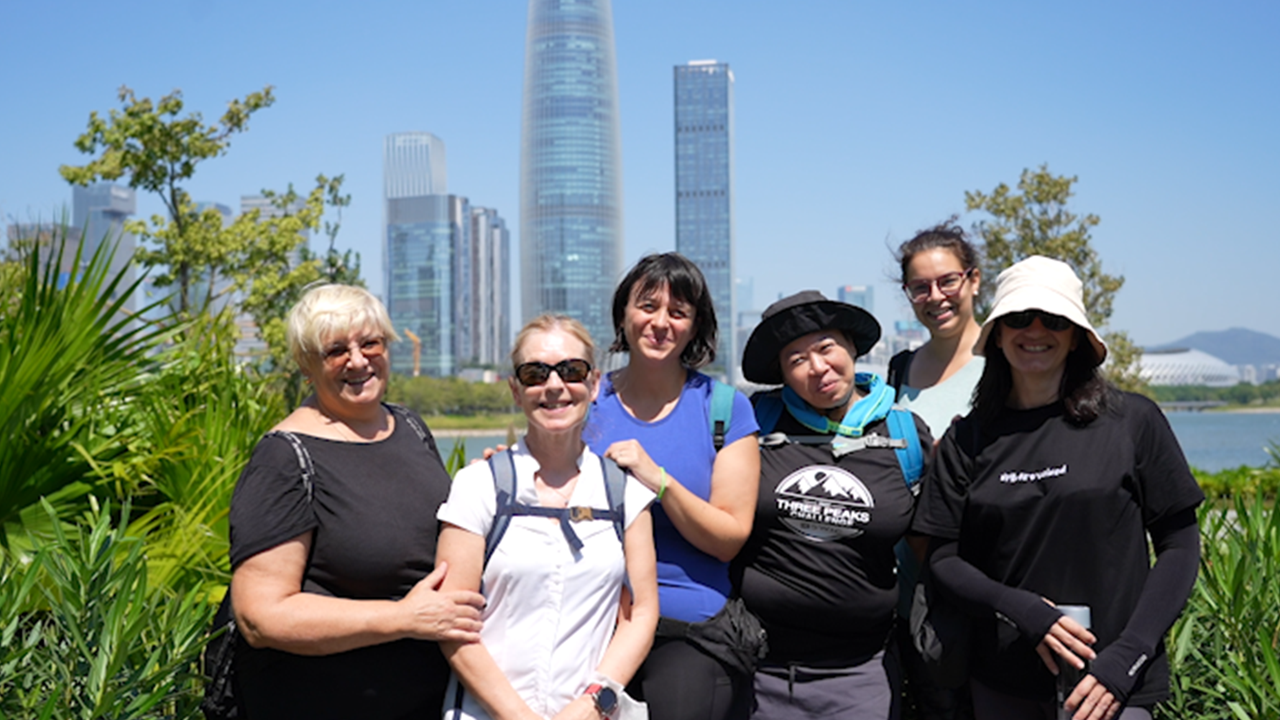
Tomoiaga (L) poses for a photo with members of SWIC at Shenzhen Talent Park in Nanshan District after they finished a hiking starting from Sea World in Shekou on Oct. 12. Lin Songtao
Tomoiaga和深圳国际妇女汇成员从蛇口海上世界徒步至深圳人才公园后,在公园留影。林松涛摄
Tomoiaga described SWIC as a social club where members can meet people from different nationalities, and join various activities and events, including tennis, hiking, crafts and gatherings for moms and their kids. There are activities organized almost every day, which cater to their nearly 200 members — half of whom are trailing spouses and the other half are working women.
SWIC是一个为女性提供社交平台的组织。成员们在这里能结交来自世界各地的朋友,也可以参加丰富多彩的娱乐活动,如打网球、徒步、做手工,妈妈和小朋友的聚会等。SWIC几乎每天都会组织不同的活动,供成员们选择参与。
The club started 36 years ago as a small group of mostly women living in Shekou, Nanshan District and has expanded its membership to other districts such as Futian, Luohu and Bao’an.
这个组织成立于36年前,成立之初是一个集中在蛇口的小团体,随着越来越多在深外籍女性了解到SWIC,成员及活动分布逐渐拓展到深圳各区,如福田、罗湖和宝安。该组织目前拥有约200名成员,一半是随迁配偶,一半是职场女性。
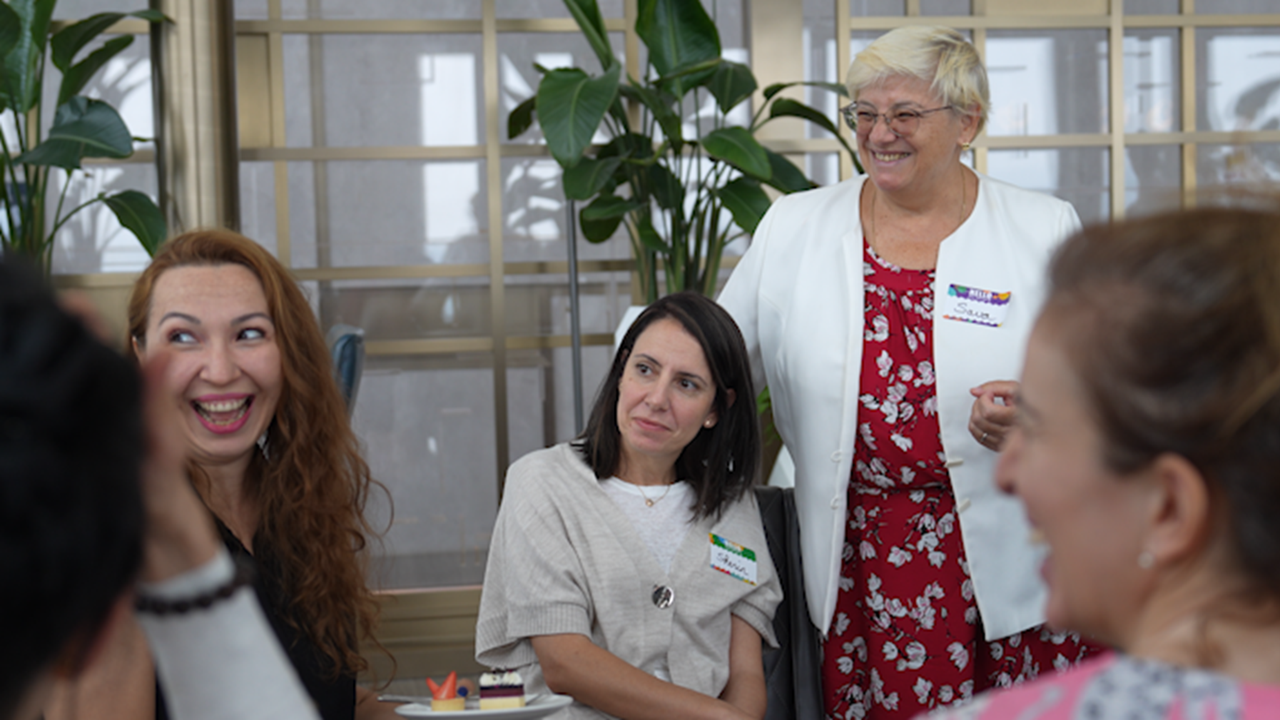
Tomoiaga (R) chats with SWIC members during their weekly coffee morning at Crowne Plaza Hotel in Futian District on Oct. 18. Lin Jianping Tomoiaga和深圳国际妇女汇成员在每周茶话会上交流。林建平摄
Companionship, sharing and exchanges connect the women. Tomoiaga recalled one time they supported a fellow member who had family issues. A Chinese girl suffering from heart disease who was adopted by the American member and her husband had to undergo major surgery. “The parents were very stressed for the girl, so we encouraged the mom and prayed for her family,” she said.
陪伴,分享和交流将这群女性聚集在一起。Tomoiaga回忆起他们曾经帮助过一位正遭受人生困境的成员。这位美国人和她的丈夫收养了一位患有心脏病的中国女孩。那时,女孩心脏病发,做了一场大手术。“父母为孩子焦心,日日处在紧张的情绪中。我们鼓励这位妈妈,为她的家庭祈祷。” Tomoiaga说道。
“When somebody is thinking of you and praying for you, you feel the support,” Tomoiaga said. “We want to make SWIC like a real family to our members and be their home away from home.”
“当有人为你着想,为你祈祷的时候,你会从内心感受到支持。” Tomoiaga说道。“我们努力让SWIC成为一个真正的大家庭,让每一位成员感受家的温暖。”
Cross-cultural communication builds stronger relationship
跨文化交流建立强关系纽带
“One of my favorite [SWIC] activities is potluck lunch. Each of us would bring a dish that represents our country. You explain what’s the tradition, where you’re from,” Jordan Scott, vice president of SWIC, said. Scott, an American who came to Shenzhen in 2019, said she made most of her friends in Shenzhen via SWIC.
“SWIC的活动中,我最喜欢的一项是百乐餐。我们每个人都会带去一道代表本国的菜,告诉大家我们来自哪里,并向大家解释关于这道菜的传统。”SWIC的副会长Jordan Scott说。这位2019年来到深圳的美国人告诉英文《深圳日报》记者,她在这座城市结交的朋友,大都来自这个妇女组织。
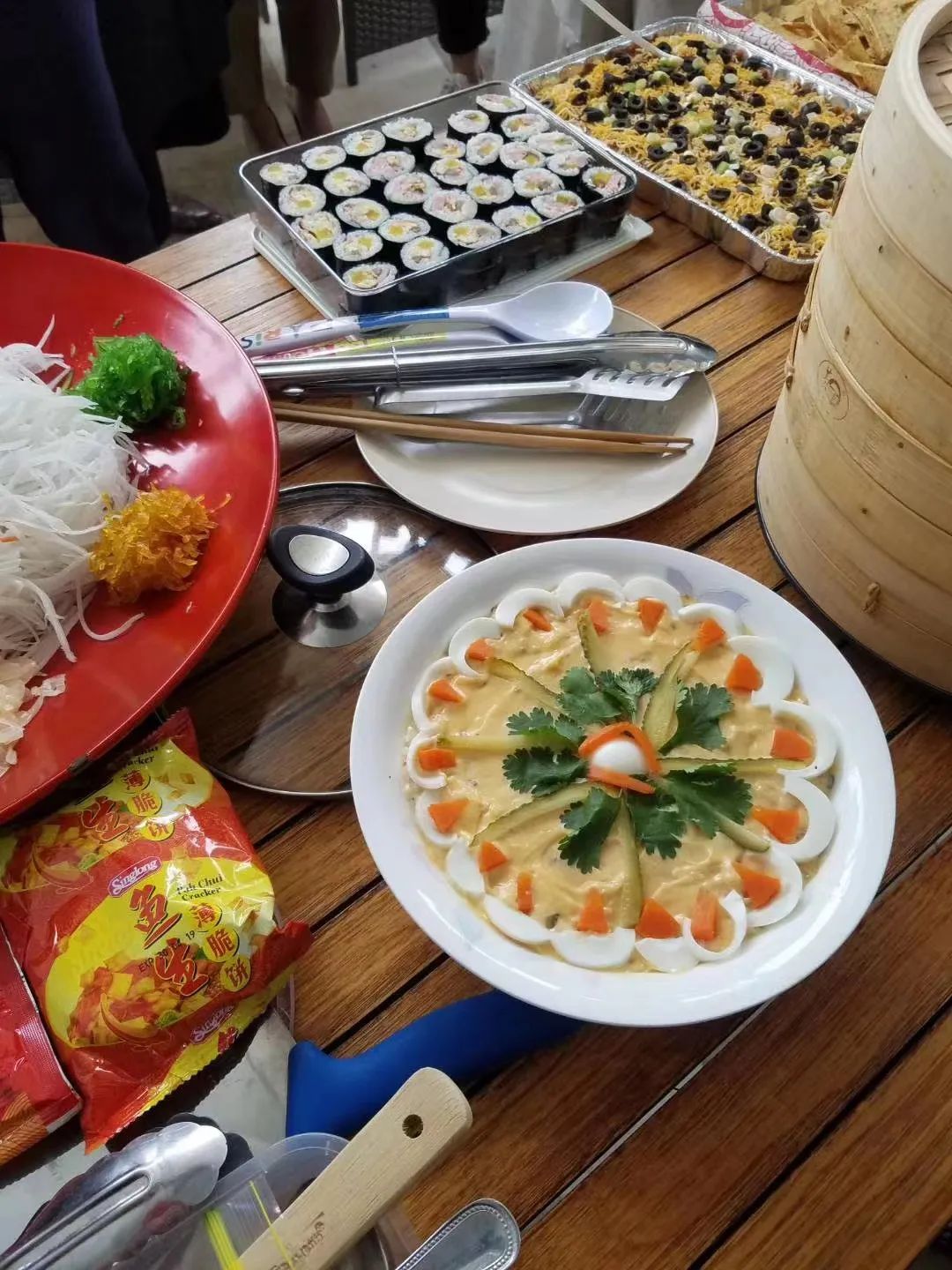
Dishes prepared by SWIC members for last year's potluck lunch. Photo courtesy of the interviewee 深圳国际妇女汇成员为去年的百乐餐准备的食物。图片由受访者提供
“Cultural exchange is interesting, and we enjoy learning the differences,” Tomoiaga said, adding that cross-cultural communication is a bridge that eliminates the gap among people from different countries and regions with various habits, customs and lifestyles. “When we understand each other’s culture, it’s much easier to be together,” she said.
“文化交流很有趣,我们乐于学习不同的文化。” Tomoiaga说。在她看来,来自不同国家和地区的人们有着不同的习惯、习俗和生活方式,而跨文化沟通是消除这些隔阂的桥梁。“当我们理解对方的文化,相处起来会更轻松。”
As a registered volunteer, Tomoiaga participated in various activities featuring Chinese culture organized for local and expat volunteers. She would like to introduce SWIC to similar themed activities.
作为一名注册志愿者,Tomoiaga参与过多项深圳为中外籍义工组织的学习中华文化的活动。她也想为SWIC成员组织这样的主题活动。
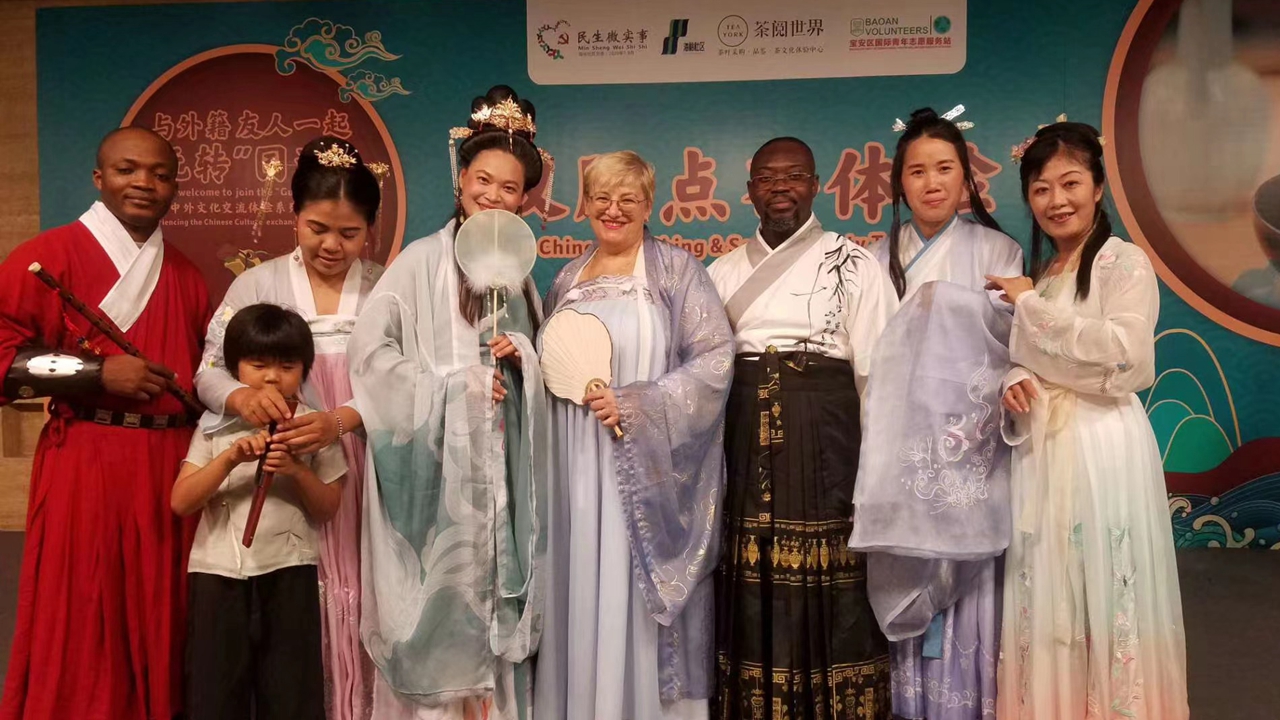
Tomoiaga (4th R) poses for a photo with expat and local residents when attending a hanfu-themed event. Photo courtesy of the interviewee Tomoiaga参加深圳为中外志愿者组织的中华文化学习活动。图片由受访者提供
“I’m going to arrange a Ming Dynasty (1368-1644) fashion show for SWIC, and it will be so nice when we all wear hanfu and do calligraphy,” she said.
“我准备为SWIC策划一场以明朝服饰为主题的时装秀。我们一边穿着汉服一边写书法的场景一定会非常有意思。”她说。
She also intends to invite Chinese people to join SWIC’s events and learn more about other countries’ cultures. Just as it helps expats establish their friend circles, SWIC also establishes partnerships with local community centers to help members get involved in their communities.
她也计划邀请中国人加入SWIC的活动,从外籍成员身上学习更多文化传统。就像SWIC帮助外籍人士扩展朋友圈,SWIC也在与社区服务中心建立友好合作关系,以帮助成员更好地融入“鹏友圈”。
According to Tomoiaga, Shenzhen is an international and inclusive city where people can feel the fusion of cultures and establish global friendship. “Shenzhen is very unique. It cannot be compared with any other city in this world.”
Tomoiaga说,深圳是一座国际化和包容性强的城市,人们可以在这体验文化交融,建立国际朋友圈。“深圳是特别的,世界上没有其他任何一个城市能和深圳比较。”